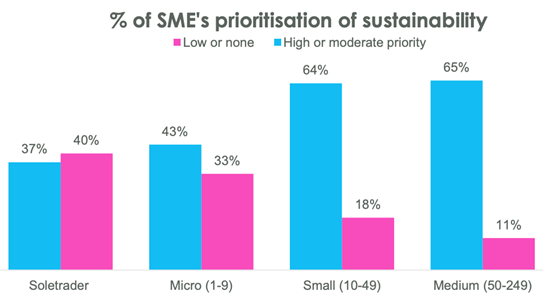According to new research, 50% of senior decision makers at SMEs prioritise sustainability, recognising its importance for long-term success. However, the analysis by Novuna Business Cash Flow also reveals that 26% of SMEs view sustainability as a low priority or have not considered it at all. Notably, medium-sized businesses with 50 to 249 employees are the most likely to prioritise sustainability, with a remarkable 65% acknowledging its significance.
To protect their profits, 47% of businesses have had to make cutbacks to their sustainability initiatives over the past 12 months. Of those, 16% have cut a few initiatives, 20% have scaled back on most initiatives, and an alarming 11% have eliminated all sustainability initiatives altogether. Unsurprisingly, out of all the SMEs, it was the small businesses with 10-49 employees that have had to make the most cutbacks (67%) when 64% of this size business stated that sustainability was a priority.
 The analysis which surveyed 500 SMEs on the state of sustainability in the business world also investigated the perception of government support for businesses in reducing their climate impact. The results indicate that 51% of SMEs believe there is not enough government support. Within the group that perceives sufficient support, a noteworthy 20% of SMEs feel there is more than enough. Medium-sized businesses (50-249 employees) are the most likely to agree that there is enough government support (59%), while sole traders are the least likely (35%).
The analysis which surveyed 500 SMEs on the state of sustainability in the business world also investigated the perception of government support for businesses in reducing their climate impact. The results indicate that 51% of SMEs believe there is not enough government support. Within the group that perceives sufficient support, a noteworthy 20% of SMEs feel there is more than enough. Medium-sized businesses (50-249 employees) are the most likely to agree that there is enough government support (59%), while sole traders are the least likely (35%).
John Atkinson, Head of Commercial Business at Novuna Business Cash Flow, commented on the research: “The findings of our analysis highlight the complex landscape of sustainability in the business world. It is encouraging to see that a significant number of SMEs prioritise sustainability, recognising its importance for future growth. However, the cutbacks made by many businesses raise concerns about the long-term commitment to sustainable practices. Our analysis underscores the need for continued support and collaboration between businesses and the government to drive positive change and create a sustainable future for all.”
For more information on Novuna’s research, click here.
Full report available here.


